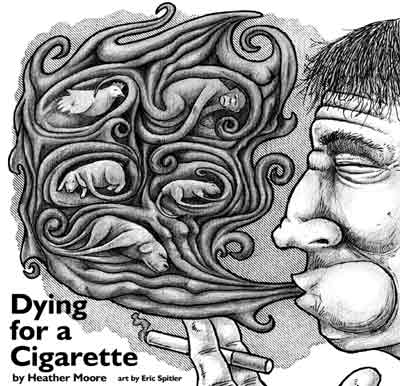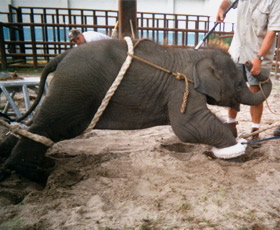Filed under: Animal Rights @ GMU, AR Action, Local Events, Protest, Use Your Voice! | Tags: Demonstration, GMU, Ringling Bros., Ringling Bros. Beats Elephants, Ringling Bros. Circus Cruelty, Ringling Circus, The Patriot Center
Ringling Bros. Demonstration Schedule for George Mason University
Please join us to protest animal abuse at GMU!
For many years, the Ringling Bros. and Barnum and Bailey Circus has come to the Patriot Center every spring semester bringing along several species of enslaved animals, including: elephants, llamas, rabbits, tigers, dogs, zebras, horses, and goats. Circus animals spend their entire lives either confined to cages or in chains, traveling eleven months of the year through weather conditions considerably different from their native habitats. In order for animals to perform circus tricks, they are beaten with metal bullhooks, shocked with electrical devices, tied down with ropes, and whipped.
Circus animals are caged, routinely beaten to incentivize their performance of tricks, and suffer both mentally and physically during their captivity. Their performances do not educate children about animals. Rather, it sends a message that animal abuse and dominion is acceptable. As an alternative to Ringling Bros., please support shows with talented, consenting performers; such as Cirque du Soleil and other acts that do not exploit animals.
These nonhuman animals are either stolen from their native ecosystems, or they are bred in captivity and removed from their mothers before their first birthday. Despite public relations campaigns that falsely advertise “conservation efforts,” Ringling Bros. has never released a captive-bred animal into the wild. Beyond physical maltreatment, circus animals are deprived of the freedom to roam, access to environmental stimuli, and the ability to engage in instinctual behaviors such as social interaction. In 2011, as a result of dozens of violations under the USDA’s Animal Welfare Act, Ringling’s parent company was ordered to pay the largest settlement against an animal exhibitor, totaling $270,000.
Please join us and lend your voice to these animals!
Demonstration Schedule:
.
Details:
All signs and leaflets will be provided. Email nooneisproperty@gmail.com for more information, especially for weather-related changes. These protests are organized by a small collective of individuals, not a major organization. We only do legal protests. If you are uncomfortable at any time, please see Lisa.
For a “vigil,” we hold signs, and candles, offer leaflets, but do not say much unless asked questions. For a “vigil/protest” we start with a vigil for the show letting out and transition to a protest for the next show. For a “protest” we hold signs, hand-out leaflets, and engage in speak-outs and some chanting (you will be given a chant sheet).
Filed under: Animal Rights News, Animal Rights Petition, Campaign, News, Protest, Uncategorized, Victory! | Tags: Elephants, GMU, Petition, Protest, Ringling, Student Government
Student Government Supports Student Protests of Ringling’s Animal Abuses
BREAKING: A few hours ago student government passed “a resolution in support of the student protest to the Ringling Brothers Circus performance at George Mason University.” The resolution cites multiple cases of animal abuses by Ringling. In 2010 alone the Ringling Brothers had numerous citations from the USDA for failures to comply with the Animal Welfare Act, including failure to maintain adequate veterinary care in two separate elephant cases and failure to control an elephant while in public.
Animal Rights Collective members spoke in front of the Student Senate of George Mason University explaining the issue and student opposition to Ringling on behalf of the collective. After a long discussion, the mostly supportive senators passed the resolution.
This is a major victory of the Mason students that have been standing up against animal abuse over the years. A petition was presented to student government with 1,667 student signatures calling for a ban on animal circuses at George Mason. You may add your name to the petition here. We plan to deliver the petition to the GMU administration in the upcoming weeks. We are currently gathering more support and raising awareness about the issue as the ‘Cruelest Show on Earth’ continues at the Patriot Center. Full protest schedule is here.
Senator Jordan and our other allies in student government are true champions in getting the resolution passed and supporting our efforts. They have stood up for what is just and right. “Animal abuse is not entertainment,” Jordan explained to the student senate before the resolution went to a vote. The resolution passed by a majority.
The student petition and the Animal Rights Collective is calling for a ban on animal circuses at George Mason. Considering that many countries are working to end the use of animals as entertainment, banning an animal circuses on campus is possible. Bolivia was the first nation to ban animal circuses, with China being second, and three councils in Australia have banned exotic animal use. The UK is currently considering a ban as well with the release of undercover footage of an Asian elephant being chained 24 hours a day and repeatedly beaten by a staff member. The parliaments of both Brazil and Peru are also considering similar bans. We can bring a ban to Mason and as Jordan advocates, “support animal-free circuses that celebrate human achievement” rather than animal domination.
You can read Resolution 23, the resolution in support of students protesting Ringling, below or check the student government website where the resolution will soon be uploaded.
—–
A Resolution in support of the student protest to the Ringling Brothers Circus performance at George Mason University
R. 23
31st Student Senate
2nd Session
R. 23
A Resolution in support of the student protest to the Ringling Brothers Circus performance at George Mason University
IN THE STUDENT SENATE OF
GEORGE MASON UNIVERSITY
April 14, 2011
Submitted by Chairman Jordan (Diversity)
RESOLUTION 23
A Resolution in support of student protests to the Ringling Brothers Circus performance at George mason University
Be it resolved that the Student Senate of George Mason University-
Whereas, there are numerous documented cases of animals dying due to lack of veterinary care
Whereas, many animals have died due to poor containment facilities,
Whereas, there are numerous documented cases of unsanitary feeding conditions,
Whereas, of the circus’s 62 elephants, 57 have been taken from their natural habitat,
Whereas, the type of elephant used in the Ringling Brother circus performances are endangered and are subject of numerous cases of mistreatment,
Whereas, the protesters do not wish George Mason University to profit from animal abuse
Therefore be it Resolved, That the Student Senate of George Mason University supports the efforts of student protesters of the Ringling Brothers Circus at the George Mason University Patriot Center
Filed under: AR Action, AR Event, ARC Events, Protest, Use Your Voice! | Tags: GMU, Protect Elephants, Ringling Protest
Ringling Brothers Demonstration Schedule for George Mason University
This is the protest schedule for the 2011 Ringling Brothers and Barnum & Bailey shows at the George Mason University Patriot Center in Fairfax, VA. Each protest will last from an hour before the show starts to the start of the show. A vigil will follow each night after the show. Signs and leaflets will be provided. Please come and lend your voice to these animals!
When:
Thursday, April 14 – 6:00 pm, Vigil 9pm
Friday, April 15 – 6:30 pm, Vigil 9:30 pm
Saturday, April 16 – 10:30 am, 2:30 pm, 6:30 pm, Vigil 9:30 pm
Sunday, April 17 – 12:00 pm, 4:00 pm, Vigil 7:00 pm
.
Tuesday, April 19 – Vigil 9pm
Wednesday, April 20 – Vigil 9pm
Friday, April 22 – 6:30 pm, Vigil 9:30 pm
Saturday, April 23 – 10:30 am, 2:30 pm, 6:30 pm, Vigil 9:30 pm
Sunday, April 24 – 12:00 pm, 4:00 pm, Vigil 7:00 pm
Where:
Meet at the West entrance of the Patriot Center.
Public Transportation:
Take the Metro Orange Line to Vienna/Fairfax. Then take the CUE Bus (Gold 1, 2 or Green 1, 2) to GMU. Once you arrive at GMU, walk south to the west entrance of the Patriot Center. In other words, once you arrive at the bus stop at GMU, follow Patriot Circle until you find the west entrance to the Patriot Center. You will reach the Patriot Center regardless of the direction you travel on Patriot Circle. The protest will at the west entrance of the Patriot Center. If you are early, we might be at the intersection of Braddock Road and Roanoke River Road. That area is south and near the west entrance of the Patriot Center.
George Mason University is located at 4400 University Drive, Fairfax, VA 22030.
Why:
Animals belong in their native habitats, not in the circus. Numerous circuses use animals such as elephants, tigers, horses, and zebras. These animals are caged, routinely beaten to incentivize their performance of tricks, and suffer both mentally and physically during their captivity in the circus. The only reason animals are used in circuses is for profit. Their captivity does not educate children about animals. Rather, it sends a message that animal abuse and captivity is acceptable.
In order for animals to perform circus tricks, they are beaten with metal bull hooks, shocked with electrical devices, tied down with ropes, and whipped. They are either stolen from their natural habitat in the wild, or they are bred in captivity and removed from their mothers before their first birthday.
These animals spend their lives in chains and travel eleven months of the year, through weather conditions considerably different from their native habitats. The remaining month is spent in a facility where the animals receive some of the most brutal training, out of the view of the public.
A lifetime spent on concrete or idling in tights cells, results in numerous physical and psychological ailments, such as osteoarthritis, tuberculosis, poor caging and housing conditions, and/or insanity. These health issues frequently lead to the premature deaths of the animals through euthanasia, long before they would have reached their natural lifespan.
Visit our Circus page for more information about the wrongs or captivity and cruelty for entertainment.

Ignore the Truth No Longer:
Watch these videos and learn more about the standard practices Ringling employs to force animals to preform tricks for the entertainment of humans.

- Keep Us Free
More Information:
Filed under: ARC Events, Campaign, Local Events, Media, Protest, Use Your Voice! | Tags: Broadside, GMU, GMU Police Trample First Amendment Rights, GMU Profits off of Animal Cruelty, Ringling Bros. Circus Cruelty, Ringling Kills Animals
Protesters Rally Against Ringling Bros. Circus: Animal Rights Collective Organizes Demonstration
Mon, 03/29/2010 – 12:19 | Broadside News Editor Yasmin Tadjdeh

Mason’s Animal Rights Collective recently organized a demonstration against Ringling Bros. and Barnum & Bailey Circus, a performing group which annually visits the Patriot Center. (Gabriella Farrugio)
——————-
For some students, the idea of a menagerie of animals coming to George Mason University is not one that settles well with them. Beginning this past Thursday, the Patriot Center hosted The Ringling Bros. and Barnum & Bailey Circus. The circus, which performs annually at Mason, will be here until Sunday, April 4. However, its opening day was met with protests from various local animal rights groups, including Mason’s own Animals Rights Collective.
At the demonstration, protesters gave out literature against the circus and animal cruelty, carried signs that read “Ringling Beats Animals” and wore body television screens, which featured videos from the People for the Ethical Treatment of Animals organization.
Michael Dupuy, a junior systems engineering major and member of the ARC said, “By hosting the Ringling Circus, [Mason is] directly supporting animal cruelty.”
According to the ARC’s website, gmu.edu/org/arc, they are “a group dedicated to raising awareness about animal rights on our campus and within the surrounding community. ARC was founded by a group of students that came together to protest the Ringling Brothers Circus on campus and to organize events pertaining to animal rights and vegan outreach . . . Our events will work to cease the suffering and exploitation of animals, and to create a greater sense of community on campus.”
Since 1992, at least 26 Ringling elephants have died, said Dupuy. “They keep their lions and tigers in enclosures that are much too small . . . Ringling brings bull hooks [to the campus], which is what they use to make the elephants perform.”
According to the website, RinglingBeatsAnimals.com, a website created by PETA, “Since 2000, the U.S. Department of Agriculture (USDA) has cited Ringling numerous times for serious violations of the Animal Welfare Act (AWA), such as . . . Improper handling of dangerous animals; Failure to provide adequate veterinary care to animals, including an elephant with a large swelling on her leg, a camel with bloody wounds and a camel injured on train tracks; Causing trauma, behavioral stress, physical harm and unnecessary discomfort to two elephants who sustained injuries when they ran amok during a performance; Endangering tigers who were nearly baked alive in a boxcar because of poor maintenance of their enclosures; Failure to test elephants for tuberculosis; Unsanitary feeding practices.”
According to a statement on RinglingBrosTrialInfo.com, a website created by Feld Entertainment, Inc., the parent company of Ringling Bros. and Barnum & Bailey Circus, on Dec. 30, 2009 a federal court case against Feld Entertainment by the ASPCA and other animal special interest groups that was filed more than nine years ago was dropped.
According to the website, Kenneth Feld, the chief executive of Feld Entertainment said, “‘We are gratified with today’s decision because it is a victory for elephants over those whose radical agenda, if adopted, could lead to the extinction of the species . . . We look forward to focusing on what we do best — providing quality care to our elephants and delivering unique family entertainment options to the public.’”
Dupuy said that in the future, he hopes that Mason would utilize circuses that did not contain animal acts, such as Cirque du Soleil, which is performed completely by humans.
Filed under: Animal Rights Issue, Animal Rights Petition, Announcement, Local Events, Protest, Use Your Voice!, Video | Tags: Animal Experimentation, Covance, Covance Cruelty, GMU, GMU Tests on Animals, Primate Liberation Week, primate testing, primates, SAEN, Vivisection
Even George Mason University endorses and will soon be conducting (if they don’t already) experiments on primates. A Biomedical Research Laboratory is being finished at the Prince William Campus, which will test on primates, rabbits and rodents, and then toss their mutilated bodies into a chemical digester. This doesn’t include the archaic and perverted animal tests that already occur on our campus. For example, the psychology department at GMU conducts testing on rodents, shocking them in order to induce fear in what is called a “fear conditioning chamber.”
That makes George Mason University President Alan G. Merten complicit in animal cruelty, tell him you do not approve.
President Alan G. Merten, Office of the President
D103 Mason Hall, Ffx, MSN: 3A1
Phone: (703) 993-8700 | Fax: (703) 993-8880
Primate Experimentation in the United States:
A National Picture
from Stop Animal Exploitation Now! (SAEN)
The Facts About Animal Experiments
Primate experimentation in the U.S. is out of control. All-time high 69,990 primates are imprisoned in US labs for experimentation – a five year increase of 31%. An equal amount are held captive for breeding, making the total closer to 120,000. We estimate that funding for primate experimentation has also increased reaching $1.6 billion during fiscal 2007. The National Institutes of Health (NIH) is responsible for most of this waste. Experimentation on primates is funded by several federal agencies including NIH, the National Science Foundation, and the Department of Defense.

Widespread Suffering
Many different species of primates including macaque monkeys, squirrel monkeys, baboons, and chimpanzees are experimented on in many different ways. Macaque monkeys are used most often, with baboons second and squirrel monkeys third. Isolation is severely stressful to primates. In fact, 10% of isolated primates are so severely stressed that they begin to engage in self-injurious behavior. Many different psychological experiments also stress primates severely. Many primates suffer terribly inside labs across the U.S.
Harvard – 2100 primates imprisoned; 55% infant mortality rate; over 300 primates in solitary confinement; many exhibiting signs of pathological behavior.
University of California, Davis – 7700 primates confined, records for 400 monkeys revealed 403 traumatic injuries, 143 amputations, along with 387 wounds, 221 bites, 70 abrasions, 171 lacerations, and 40 fractures. Experiments confine primates to restraint chairs and use water deprivation.
Wake Forest – imprisons over 1000 primates; monkeys are socially isolated, deprived of sleep and subjected to addiction drugs.
University of Wisconsin Madison — (UW) imprisons approximately 1500 primates. Primates escape from cages severely injuring other animals. Other monkeys suffer with brain abscesses due to the bolting of devices into the bones of the skull.

University of California, San Francisco – Over 100 primates incarcerated; government documents reveal primates deprived of water for as much as 22 hours per day. Monkeys lose over 15% of their body weight and self mutilate in neurological experiments.
Southwest Foundation for Biomedical Research – imprisons over 5700 primates; recently cited for beginning post-mortem dissection of a baboon that was not yet dead.
University of Washington, Seattle – Over 2200 primate imprisoned. Recently cited for performing unapproved surgical procedures – one researcher entirely removed the head of a primate.
Johns Hopkins University – confines over 800 primates; monkeys are used in drug addiction experiments and brain mapping projects which force electrodes directly into the brain of conscious animals.
University of Minnesota – imprisons over 180 primates; drug addiction experiments during which primates are so stressed that they rip out their own hair while screaming; other monkeys are deprived of water and socially isolated.

Many diseases and conditions plague the primates that are held captive within laboratories, such as: meningitis, pneumonia, encephalitis, hepatitis, and gastric bloat. Monkeys often lose fingers, toes, and tails through amputation.
Common experimental practices include depriving primates of food or water so that these things become effective rewards. In some instances, the primates may receive water for only an hour or two per day, or are deprived of as much as 20% of their regular food intake.
The use of primate restraint chairs is also common, with confinement reaching as much as 104 consecutive hours. These devices are highly stressful for normally active and mobile primates. In brain mapping experiments many devices are literally bolted onto the skulls of primates, and electrodes are fed directly into the brain. Intravenous catheters are surgically implanted in experiments with addictive drugs. These devices can lead to serious infections, and other potentially fatal conditions.
Government Waste
Most primates are not used in experiments that study the diseases that kill most Americans. Projects that study primate psychology, alcohol & addictive drugs, brain-mapping, and sex in primates far outnumber studies involving heart disease or cancer. Repetition is rampant among NIH-funded projects. Currently, the National Eye Institute funds 57 projects that use primates in brain-mapping. These duplicative experiments waste over $110 million every five years. Many of these projects continue on for decades wasting millions of tax dollars each year and victimizing primates for an entire lifetime.
Remember one thing: the primates who are suffering in laboratories as you read this letter are depending on us to work together to fight for their freedom. We must exercise our rights (free speech, freedom of assembly, etc.) so that we can fight for the recognition of their rights. They have no voice but ours. They have no protection, no hope, unless you act. For every activist that does nothing, more primates suffer and die.
To learn more about primate experimentation in the US, visit SAEN.
Video: Cruelty at Covance Labs in Vienna, VA
Sign the Covance Petition

Did you know Tylenol kills cats and dogs? Or that Penicillin kills guinea pigs? Learn why animal testing is antiquated and about alternatives to animal testing.
Learn more about primates in laboratories.
Unseen they suffer,
Unheard they cry,
In agony they linger,
In loneliness they die.

Your Liberation is Bound Up in Mine

“Injustice anywhere is a threat to justice everywhere.”
– Martin Luther King, Jr.

Welcome to the Animal Rights Collective (ARC) Blog. We are (mostly) members of George Mason University, but we welcome members from the greater community that are interested in animal rights.
The Animal Rights Collective (ARC) is a group dedicated to raising awareness about animal rights on our campus and within the surrounding community. ARC was founded by a group of students that came together to protest the Ringling Brothers Circus on campus and to organize events pertaining to animal rights and vegan outreach.
We are a non-hierarchal group, meaning that our members are not arranged in any rank of authority. We do not recognize positions of president, vice president, etc. Collectives are an attempt to share power and typically operate on a consensus-driven and egalitarian basis. We believe that this allows each member of the group to feel empowered, remain autonomous, and know that their voice is equal to that of every other member. We welcome everyone to bring their thoughts and desires to the table, and our goals and campaigns will be determined by this collective energy.
We do not discriminate on the basis of race, class, gender identity, sex, sexual orientation, ethnicity, age, linguistic background, religion, or physical ability.
We’ll be blogging regularly about our campaigns, events, meetings, and doing our best to keep you up to speed about what’s going on with the Animals Rights Movement.
Stay tuned…
p.s. Visit our website!

























